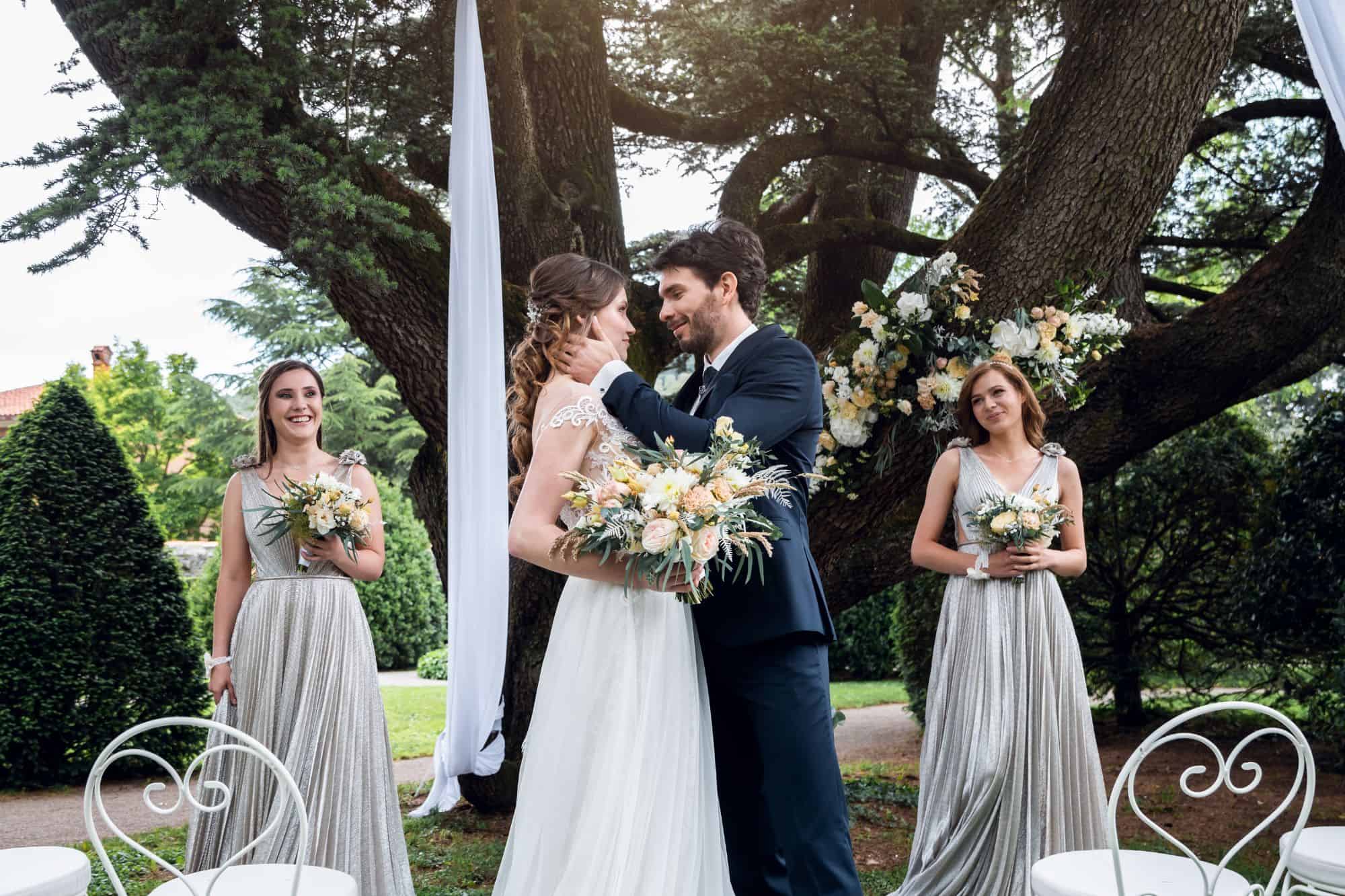When planning a wedding, couples make numerous decisions to ensure their special day is both memorable and meaningful.
One significant choice is whether to have an unplugged ceremony, where guests are asked to refrain from using phones, cameras, and other devices.
This approach encourages everyone to focus on the moment rather than being distracted by technology.
In a world where social media often overshadows real-life experiences, an unplugged wedding offers a refreshing alternative that fosters presence and connection.
Below, we’ll explore why couples increasingly choose unplugged ceremonies and how this decision enhances the overall wedding experience.
Let’s get straight to the point
An unplugged wedding ceremony asks guests to refrain from using phones and cameras, allowing everyone to focus on the couple and the moment without distractions.
This approach creates a more intimate atmosphere, ensures professional photographers can capture key moments without interference, and helps maintain privacy.
It also reduces pressure on guests, encourages mindfulness, and prevents disruptions. Clear communication of the unplugged request is essential for its success, and couples can opt for partial unplugged ceremonies to strike a balance.
Overall, an unplugged ceremony fosters a more meaningful and memorable wedding experience.
What Is an Unplugged Wedding Ceremony?
An unplugged wedding ceremony is one in which couples request that their guests turn off or put away all electronic devices.
This includes smartphones, cameras, and tablets, ensuring that the ceremony remains free of technological distractions.
The goal is to create a more intimate, focused, and meaningful event where everyone can fully engage with the proceedings without the interruptions that devices often bring.
For many couples, this approach helps maintain the sanctity of the moment and allows professional photographers to capture the best shots without interference.
Why Do Couples Opt for Unplugged Ceremonies?
There are several compelling reasons couples opt for unplugged wedding ceremonies.
These reasons not only enhance the ceremony but also contribute to a more profound and enjoyable experience for both the couple and their guests.
1. Keeps the Focus on the Moment
One of the primary reasons for an unplugged wedding is to help everyone stay present.
Weddings are emotional and significant events, but guests can easily become preoccupied with capturing the perfect photo or sharing updates on social media.
By asking guests to set aside their devices, couples encourage everyone to be fully present, allowing them to experience the ceremony’s emotions and significance in real time.
This focus on the moment creates a more heartfelt and meaningful atmosphere for everyone involved.
2. Professional Photos Without Interruptions
Professional photographers often face challenges when guests are taking their own photos during the ceremony.
Guests may inadvertently block important moments, or their flashes may interfere with the photographer’s work.
An unplugged ceremony ensures that professional photographers have a clear path to capture key moments, resulting in high-quality images.
These images will not be marred by phones or cameras in the background, allowing the couple to enjoy timeless, beautifully captured memories.
3. Avoids Unflattering or Unwanted Photos
In the age of social media, guests may post photos online without the couple’s knowledge or consent.
These images may not always be flattering, and they may be shared before the couple has had a chance to see or approve them.
An unplugged wedding helps couples avoid this issue by maintaining control over which photos are shared and when.
It allows them to preserve the dignity and beauty of their special day without worrying about awkward or unflattering images being circulated online.
4. Reduces Pressure on Guests
Some guests feel an unspoken obligation to document every aspect of a wedding, from the ceremony to the reception. This can add unnecessary pressure and distract them from fully enjoying the day.
By requesting an unplugged ceremony, couples relieve this pressure, allowing their guests to relax and immerse themselves in the celebration.
Guests can participate fully in the moment without worrying about capturing the perfect shot or updating social media.
5. Fosters a More Intimate Ceremony
An unplugged ceremony fosters a sense of intimacy and connection between the couple and their guests.
Without the distraction of devices, guests are more likely to engage emotionally with the ceremony, creating a shared experience that is deeply personal.
This heightened level of engagement helps to create a closer, more meaningful connection among everyone present, making the ceremony even more special for the couple and their loved ones.
How Does an Unplugged Wedding Encourage Mindfulness?
In today’s fast-paced world, filled with constant notifications and digital distractions, it can be challenging to focus on the present moment.
A wedding is a time to step away from these distractions and concentrate on what truly matters—the couple’s love and commitment.
An unplugged wedding encourages guests to practice mindfulness by putting down their devices and fully experiencing the emotions, words, and moments of the ceremony. This heightened awareness allows everyone to connect more deeply with the significance of the event.
6. Prevents Disruptions During the Ceremony
Even when phones are silenced, their use can still be disruptive. The sound of camera clicks or the sight of guests holding up devices can break the flow of the ceremony, creating visual and auditory distractions.
By requesting that all devices be turned off, couples minimise the chances of these interruptions, ensuring that the ceremony proceeds smoothly and without disturbance.
This helps maintain the focus on the couple and the emotional weight of the vows being exchanged.
7. Protects Privacy
In a world where almost every moment is shared online, many couples prefer to keep their wedding day private.
An unplugged ceremony helps to safeguard this privacy by preventing unauthorised photos or videos from being posted on social media.
This way, couples have complete control over how and when their special day is shared with the world. It also ensures that the wedding remains an intimate event, enjoyed primarily by those who were present.
8. Gives Couples Control Over Their Story
By choosing an unplugged ceremony, couples can control how their wedding day is presented to the outside world.
Guests may post photos that don’t reflect the couple’s vision or highlight moments they didn’t intend to share.
By limiting device use, couples can ensure that only professional, carefully curated images are shared publicly.
This allows the couple to tell their story in a way that aligns with their values and preserves the integrity of their wedding day.
How to Communicate the Unplugged Request Effectively
Clear communication is key to ensuring that guests understand and respect the request for an unplugged ceremony. Without explicit instructions, guests may not realise the importance of putting away their devices. Couples can convey their wishes in several ways:
- Include the Request on Invitations: Mention the unplugged ceremony in the invitation, letting guests know ahead of time that devices will not be permitted during the ceremony.
- Post Signs at the Venue: Place visible signs at the ceremony location, politely reminding guests to turn off their devices before the event begins.
- Announce the Request Before the Ceremony: Have the officiant or a member of the wedding party announce the unplugged request just before the ceremony starts to ensure everyone is aware.
Respecting the Couple’s Wishes
Ultimately, an unplugged wedding is about respecting the couple’s wishes for their special day.
Weddings are deeply personal events, and the couple’s request for an unplugged ceremony reflects their desire for a meaningful, intimate celebration.
By following this request, guests show their support and honor the couple’s vision for their wedding.
Conclusion
An unplugged wedding ceremony offers couples a unique opportunity to create a more intimate, distraction-free celebration.
By asking guests to turn off their devices, the focus remains on the couple and the emotions of the day, allowing professional photographers to capture the best moments without interference.
This approach not only preserves privacy but also encourages mindfulness and presence among guests.
With clear communication and a thoughtful approach, an unplugged ceremony can lead to a more connected, memorable, and enjoyable experience for everyone involved.
Frequently Asked Questions
Do you bring your phone to your wedding?
But at your wedding ceremony and reception, there’s no need to carry your phone-the only thing you should be carrying around with you is your bouquet! It’s also impractical unless you plan to carry a purse on your wedding day, which many brides don’t do.
How do you tell guests no phone during ceremony?
The couple respectfully requests that all guests honor the sanctity of this moment by turning off cell phones and cameras. Emotional: I invite you to be truly present at this special time. Please, turn off your cell phones and put down your cameras.
How do you get announced at the end of a wedding?
Some couples choose to still be introduced as Mr. and Mrs. Groom’s Last Name, since the bride may go by her husband’s name socially.
How do you politely say no pictures at a wedding?
“We’re so glad you’re here! Please stow away your phones and cameras until the reception. We promise to share the beautiful pictures taken today.” “Please honour our wishes with no photos until we’re announced as Mr and Mrs!”
Is it rude to be on your phone during a wedding?
It goes without saying that you should put away your cell phone during the wedding ceremony. Not only is it a huge distraction, but it’s also going to make you miss out on a very important event in a friend or family member’s life.



